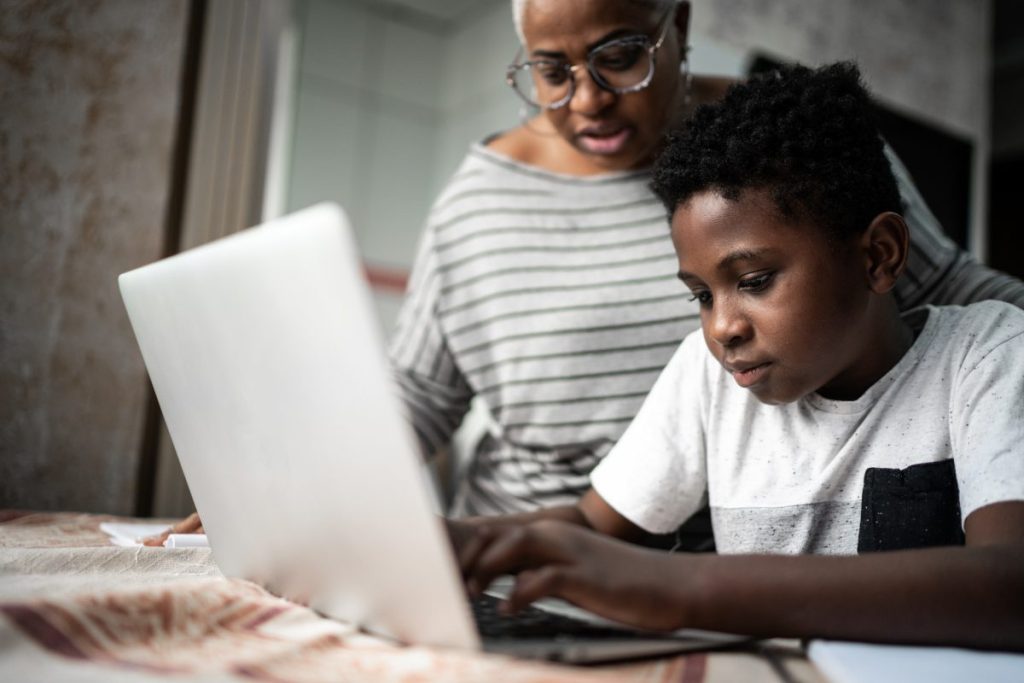Kids are online now more than ever before. Thanks to smartphones, gaming, and the current health pandemic forcing many schools online, kids of all ages have seemingly unlimited access to the internet and the dangers it can present. With younger children, it’s easy for parents to monitor their child’s online activity, but as kids get older, they are more entrusted with spending time online unsupervised. While you may trust your tween to surf responsibly, it’s important they know how to protect their privacy while online. Digital safety for kids is just one more thing parents need to worry about when it comes to their tweens. Tween online privacy can be a major issue.
The internet provided a way for kids to stay connected, to learn, and to be entertained during the coronavirus health pandemic. However, it’s important that kids keep themselves as safe as possible while surfing, and that ‘stranger danger’ is still a thing in the virtual world. Trafficking, online bullying, exploitation, and identity theft are all very real threats to kids as they spend more time than ever before online. Carly Yoost, the founder of the Child Rescue Coalition, explained to Good Morning America why parents need to be vigilant.
“With school closures and more kids using online learning platforms more than ever, we have to remember that there are still risks with child predators lurking inside apps and behind the keyboard. We don’t want to discourage parents and schools from using these tools, just to remember to still follow safety guidelines.” The good news is that there are many ways that parents can help protect their children’s privacy online while still allowing them to remain connected.

Set ground rules
It’s been a busy and hectic time for parents recently, which means constantly monitoring the online activities of children isn’t always possible. One way parents can help protect their children online is to set some basic ground rules around internet use. Safewise suggests parents explain to their teens what’s expected of them when they are online, as well as outline basic safety practices. Reinforce with your tween that they should never share their passwords or usernames even with their friends and to avoid having any kind of shared account with anyone else. Parents should also provide a list of which sites and apps are off-limits to their tweens, especially popular social media and gaming sites. They also suggest that parents go over online safety rules with their kids, including warning them against accepting friend requests from strangers, not clicking on random links, and not sending or posting pictures of themselves online.
Education is key
Tweens often don’t understand why they shouldn’t post a certain picture, click on a link in a text, or not accept that random friend request, which is why it’s so important for parents to sit down and educate their kids about internet safety. Simply telling a child not to do something won’t be as effective as telling them why they shouldn’t do it. The internet is full of hackers, sexual predators, and scammers who prey on those who aren’t internet safety savvy. Parents should explain to their children that they need them to take their online safety seriously to avoid being taken advantage of.
Monitor their activity
There’s a fine line between giving your children their own privacy and maintaining their safety. Many parents feel conflicted about monitoring their tween’s online activity, but sometimes that’s the best way to ensure they are surfing and browsing safely. Amina Fazlullah, policy counsel with Common Sense Media told Consumer Reports that it can be hard for parents to monitor what their tween is doing online. “The very private nature of phones and tablets makes it far easier for kids to explore beyond established boundaries.” However, Fazlullah suggests that parents who want to give their children their privacy while still ensuring they are surfing safely can impose ‘off-limits’ rooms in their homes, such as bedrooms and bathrooms, and set up a communal charging area where devices stay overnight.

Digital safety for kids
There are a number of parental control filters parents can install on their children’s devices that will help keep them safe and private while online. Bark is a popular app that monitors text messages, YouTube, emails, and over 30 different social networks for potential safety concerns, giving parents peace of mind when their children are online. Many social media sites like YouTube and Google have their own safety settings that parents can activate to ensure their children aren’t exposed to anything they don’t want them to see. Parents should always visit the ‘settings’ tab when their child downloads something new to ensure the proper privacy settings are selected.
Know the passwords
Knowing the usernames and passwords to your child’s email, social media apps, and any other sites they may use is just one more way parents can ensure their child’s privacy online. Not only will it protect a child from potentially being taken advantage of by a stranger, but it can also allow the parent to see how their child is using the internet and social media. Yoost also suggests parents always have their children’s social media accounts turned to private and turn off location tracking. She also suggests that when using an iPhone, make sure the camera is set to never allow a child’s location to be seen. To do this, go to Settings > Privacy > Location Services (ON) > Camera set to NEVER.
The internet can be a scary place sometimes but speaking to tweens openly about safety and responsibility can help ensure their privacy is protected while online. By doing so, we can protect our own children and others from the dangers this global connection can pose.



